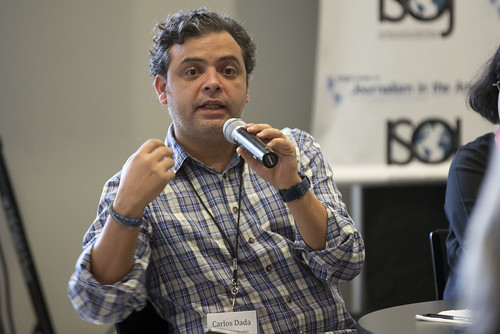April 5, 2014 | Transition to Digital
“Journalism” always comes before “online,” say journalists from conflict zones at ISOJ

In online journalism, “online” is never more important than “journalism.” That was the main message of Carlos Dada, founder and director of Salvadorian news site El Faro, who was one of the participants at a breakfast panel during the second day on the 15th International Symposium on Online Journalism.
“I don’t understand what is online journalism,” Dada said. “Journalism is a method. The rest is more efficient tools to do our job.”
The April 5 panel, “Online journalism during political transitions and conflict,” brought together a range of journalists from various conflict zones to discuss the need for quality journalism and the promises and pitfalls of social media in promoting more accurate communication.
Dada, who runs the leading online news agency in El Salvador, said that social media is a valuable tool for getting information into the hands of ordinary citizens by bypassing the normal distribution channels, but that standards still trump speed and access.
“Let’s not confuse journalism with social media and citizen opinion,” said Dada, adding that journalists still have the responsibility of separating information from misinformation.
Dada called for journalists to keep their eyes focused on investigative reporting, even with the new ways of reaching people.
“We still hate to sit down with hit-men, victims, [honest] policemen, and corrupt policemen,” he said.
Other online journalists working in conflict zones also expressed a healthy skepticism of the new tools at their disposal and spoke about their efforts to bring watchdog journalism to their regions.
Nataliya Gumenyuk, co-founder of the non-partisan Hromadske.tv in Ukraine, which is dedicated to exposing illegal government actions, said that the recent protests and conflict between Russia and the Ukraine over the Crimean territory have highlighted the need for quality reporting that takes into account popular voices that bypass a worn “commercial” media.
Addressing the recent conflicts, she expressed frustration with the Russian-language news sources, and nationalist discourse in general. “The conflict is not between nations. The conflict is between [the] informed and uninformed. With Russia, everything is relative,” she said.
Other panelists included Jacob Akol, editor at Gurtong Trust Peace and Media Projectin South Sudan, and Myo Min Oo (Ye Ni), editor at The Irrawaddy’s Burmese in Myanmar, and and Aunohita Mojumda, associate editor at nonprofit magazine Himal Southasian in Nepal.

